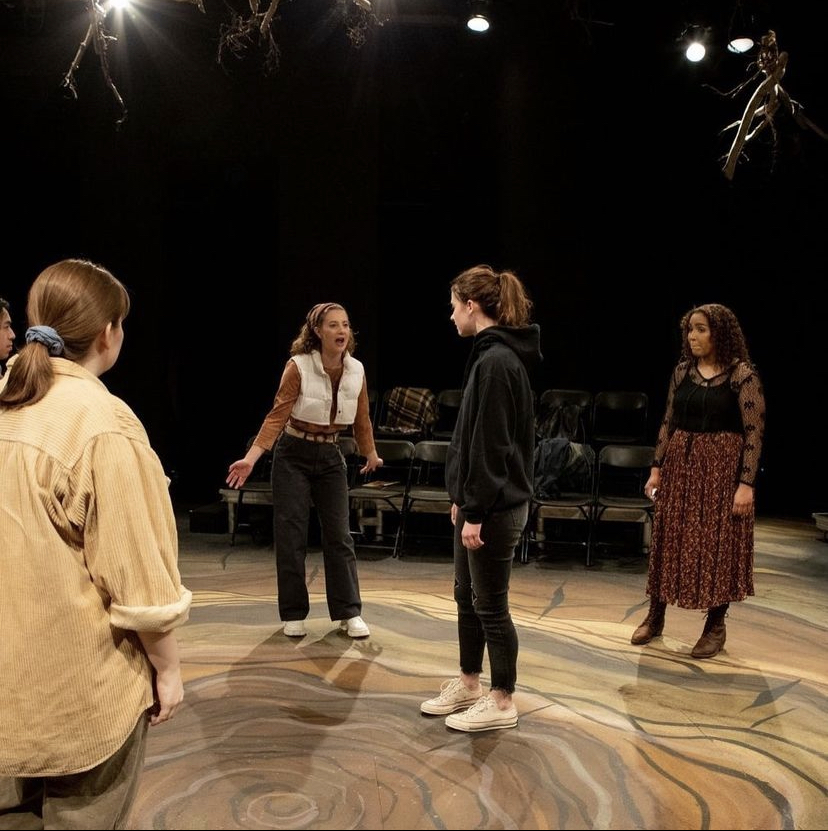What we gain in life, we gain in death
SPU’s theatre department explores what it means to live in ‘Everybody’
May 19, 2023

Death is the most elusive subject that everybody, from writers to philosophers to even the kid next door, debate and discuss. Everybody, at some point, has been rattled with what it means to die and how our bodies join the others in the afterlife. Is there a future beyond the grave?
Seattle Pacific University Theatre’s show “Everybody” is an adaptation of the late 15th-century play “Everyman,” which, according to the narrator, was adapted from several religious ideologies about death, such as Buddhism, Catholicism and Orthodoxy.
From beginning to end, the play was encapsulating. The narration at the beginning made the mundane nagging of silencing phones entertaining and emphasized silence from the audience. From there, they introduced God and Death, the two structural characters implementing the idea that all creation will die shortly.
The play features a lot of symbolism, including colors, clothing and attitudes. All of the characters in the space start out wearing very earthy tones, emphasizing the narrator’s talk of how every living thing is recycled into something different. The stage was decorated with tree rings and roots hung overhead, which further illustrated the idea of life and how humans are all connected through what they are made up of. Going even deeper, characters such as Friendship and Cousin wear coats with photo memories and quilted designs, emphasizing the bonds between them and Everyone.
On a circular stage, the actors were allowed to break the barriers between themselves and the audience. This created a more encapsulating experience, as the actors could rejoin the audience just as quickly as they could become characters in the show.
One of these actors is first year Charlotte Choat, an honors and linguistics major, who played Senses and was a dancer. Choat said that the director, Bretteney Beverely, planned to make the audience uncomfortable with the involved material.
“It’s about everybody, and so when you’re closer towards the stage, when you’re almost part of the production, I feel like the audience feels more involved and is more drawn in,” Choat said.
For Choat, she recognized how crucial the stage’s structure was to the show, but she mentioned that it was difficult as an actor to present it to such a close audience.
“It’s a little strange to me because I don’t know whether to interact with people or not, but I think it’s kind of fun, especially like watching people’s interactions or watching people’s reactions to it all up close is like, I don’t know, it’s kind of fun,” Choat said.
In the audience, it is not always easy to tell who the actors are and who the audience is until the show begins. The actors are scattered around the circular stage and are members of the audience. Besides not having lines, the audience is just as much a part of the story as the actors themselves.
As the play went on, it was clear that all of the characters made their roles their own, even the ones with smaller parts. For Choat, it was acting drunk as Senses, showing how our five senses can affect our feelings while our physical bodies are alive.
“All the other actors seem to love my Senses. Bretteney was just really excited about letting me be able to be drunk on stage. So, I’m having a lot of fun with it, and I think I made the role my own,” Choat said.
Each night, the characters are assigned based on a lottery given by the Usher (Hannah Lund), who also plays God and Understanding. The randomized characters are played by Clara Christensen, Ellie Duenow, Lia Harper, Atlas Peek and Carson Wong. They each have the opportunity to play, Friendship, Kinship, Cousin, Stuff and Everybody.
One of the randomized characters was played by third year theatre education major Lia Harper. Though it was difficult memorizing multiple roles, Harper recognized that this was a once-in-a-lifetime opportunity to grow as an actor.
“Every night we would switch who everyone would be, and it really was just a process of perfecting every character for every actor,” Harper said.
On Thursday, May 11, Harper played the role of Stuff, which is her favorite of the four because of how materialistic she could play the character.
“Stuff is just the materialistic person that you know, but like times like a hundred,” Harper said.
As one of the randomized actors, Harper began as a member of the audience who soon revealed herself to be a part of the show, which surprised the audience.
“Doing theatre in the round is more challenging because you are so close to the audience, but it also makes everything so personal! It makes you and the audience connect even more,” Harper said.
Every time an actor rejoined the audience, it was a reminder that this was a play where anything can happen. Viewers will only know what will happen next if they keep their eyes on the actors and embrace the unpredictability of life.
“I feel like it’s a good summary of life. Having heard the script so many times going through it, I feel like the way it is written is just like how people regularly talk,” Choat said. “But then it’s also about talking about tough subjects and asking questions that everybody asks. I think it’s just really thought-provoking. It has a good mix of humor and seriousness, which is what life is.”

























































































